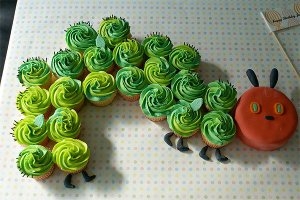
If you have kids, you’ve probably read the children's book: The Very Hungry Caterpillar, see, at least five thousand times. If you haven’t had the pleasure, here’s a brief plot summary. A caterpillarhatches from a small, white egg. Extremely hungry, the caterpillar proceeds to eat through several pieces of fruit, an assortment of junk food, and finally, to clear the palate, a nice green leaf. At the risk of ruining the ending, on the final page the caterpillar turns into a beautiful butterfly.
如果你身为人父或身为人母,那你对儿童读物《肚子好饿的毛毛虫》一定不会陌生。如果你还没读过这本书,不要紧,故事讲述了这样一个故事:一条毛毛虫从一个又小又白的卵壳里爬出,饥肠辘辘的毛毛虫狼吞虎咽地咽下不少水果和垃圾食物,最后,还啃下一片可爱的绿树叶来清清肠道。故事的结尾很美满,毛毛虫破茧成蝶!
Good plot, great characterization, enticing illustrations. But it leaves out the most exciting part–plant-insect warfare. In the real world, some caterpillars and plants engage in a deadly struggle for survival. We’re talking full-scale battle, involving chemical weapons no less.
故事情节很好,文笔细腻,插图精美。但是遗漏了最精彩的环节:植物大战毛毛虫。在现实中,毛毛虫和植物为求生存而殊死搏斗,而全面战争肯定少不了化学武器。下面我们就来谈谈吧!
Scientists have known for some time that many plants protect themselves from insect attacks by producing toxins that either ward off or kill insects when they attempt to have the plant for lunch. What scientists have only recently discovered, however, is that the common caterpillar is not without its own arsenal of chemical agents. According to recent studies, a caterpillar can sense when a plant is about to unleash its chemical weapons and counter by producing anti-toxins to neutralize the plant’s attack.
科学家很早就发现,一些植物释放或分泌有毒物质,击退视植物为午餐的昆虫,以求自保;而这些有毒物质有时是致命的。直到最近,科学家才发现原来毛毛虫普遍也有自己的“化学兵工厂”。据最新研究表明,毛毛虫可以感应植物何时准备释放“化学武器”,而分泌有毒物质抗体,与植物抗衡。
So far, caterpillars seem to have the upper hand. Although different plants produce a wide variety of toxins, many ultimately rely on two main chemicals. Since caterpillars have evolved to neutralize these chemicals, they are able to infest over one-hundred toxin-producing plant species across the United States.
目前,毛毛虫稍占上风。虽然,千差万别的植物释放的有毒物质品种繁多,但是主要归结于两大类。而毛毛虫进化得足以抵御这些化学物质,足以自如应对全美上百种有毒植物。













